Evaluating Social Media's Impact on Tourism Destination Selection
VerifiedAdded on 2020/12/10
|11
|2778
|265
Report
AI Summary
This report examines the significant impact of social media platforms on tourism destination selection, focusing on a case study of Malta. The introduction outlines the purpose, significance, and background of the research, along with the research questions and objectives. Chapter 2 details the research methodology, including the research philosophy (positivism), approach (deductive), design (exploratory), and strategy (qualitative), along with data collection methods (primary through questionnaires) and sampling techniques (random). Chapter 3 covers data analysis, employing thematic analysis to interpret the collected data. The report also addresses ethical considerations, referencing, and presentation standards in Chapter 4. The study aims to identify the role of social media in the tourism sector, analyze the impact of various networking platforms, and determine the factors influencing destination choices, ultimately providing insights into how social media shapes tourist behavior and decision-making processes. The report utilizes both primary and secondary research to explore the influence of social media, such as online reviews and social networking sites, on consumer behavior, emphasizing the evolving trends in the tourism sector and the importance of social media in marketing and information dissemination.

Research Methodologies
Paraphrase This Document
Need a fresh take? Get an instant paraphrase of this document with our AI Paraphraser
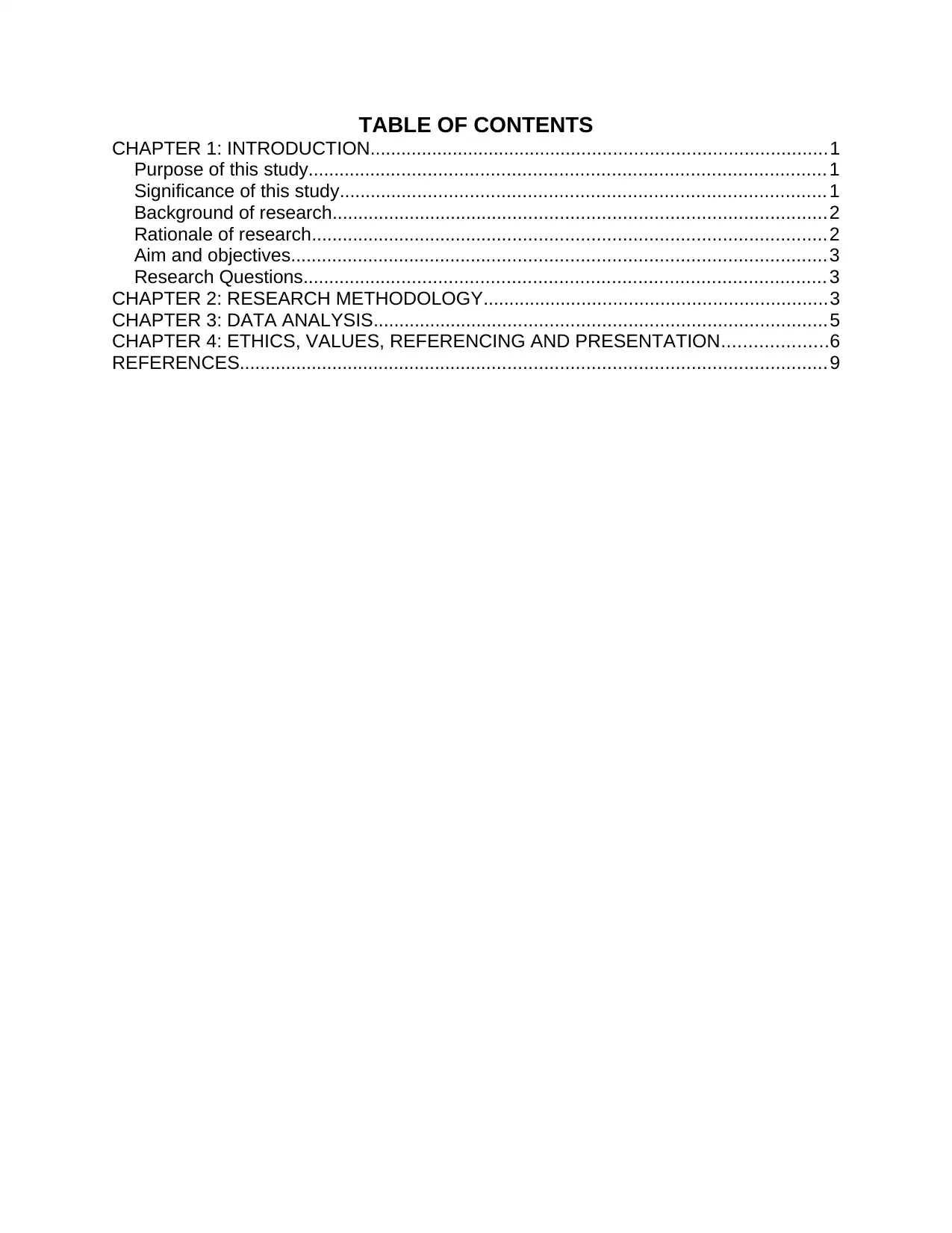
TABLE OF CONTENTS
CHAPTER 1: INTRODUCTION........................................................................................1
Purpose of this study................................................................................................... 1
Significance of this study............................................................................................. 1
Background of research...............................................................................................2
Rationale of research...................................................................................................2
Aim and objectives.......................................................................................................3
Research Questions.................................................................................................... 3
CHAPTER 2: RESEARCH METHODOLOGY..................................................................3
CHAPTER 3: DATA ANALYSIS.......................................................................................5
CHAPTER 4: ETHICS, VALUES, REFERENCING AND PRESENTATION....................6
REFERENCES.................................................................................................................9
CHAPTER 1: INTRODUCTION........................................................................................1
Purpose of this study................................................................................................... 1
Significance of this study............................................................................................. 1
Background of research...............................................................................................2
Rationale of research...................................................................................................2
Aim and objectives.......................................................................................................3
Research Questions.................................................................................................... 3
CHAPTER 2: RESEARCH METHODOLOGY..................................................................3
CHAPTER 3: DATA ANALYSIS.......................................................................................5
CHAPTER 4: ETHICS, VALUES, REFERENCING AND PRESENTATION....................6
REFERENCES.................................................................................................................9
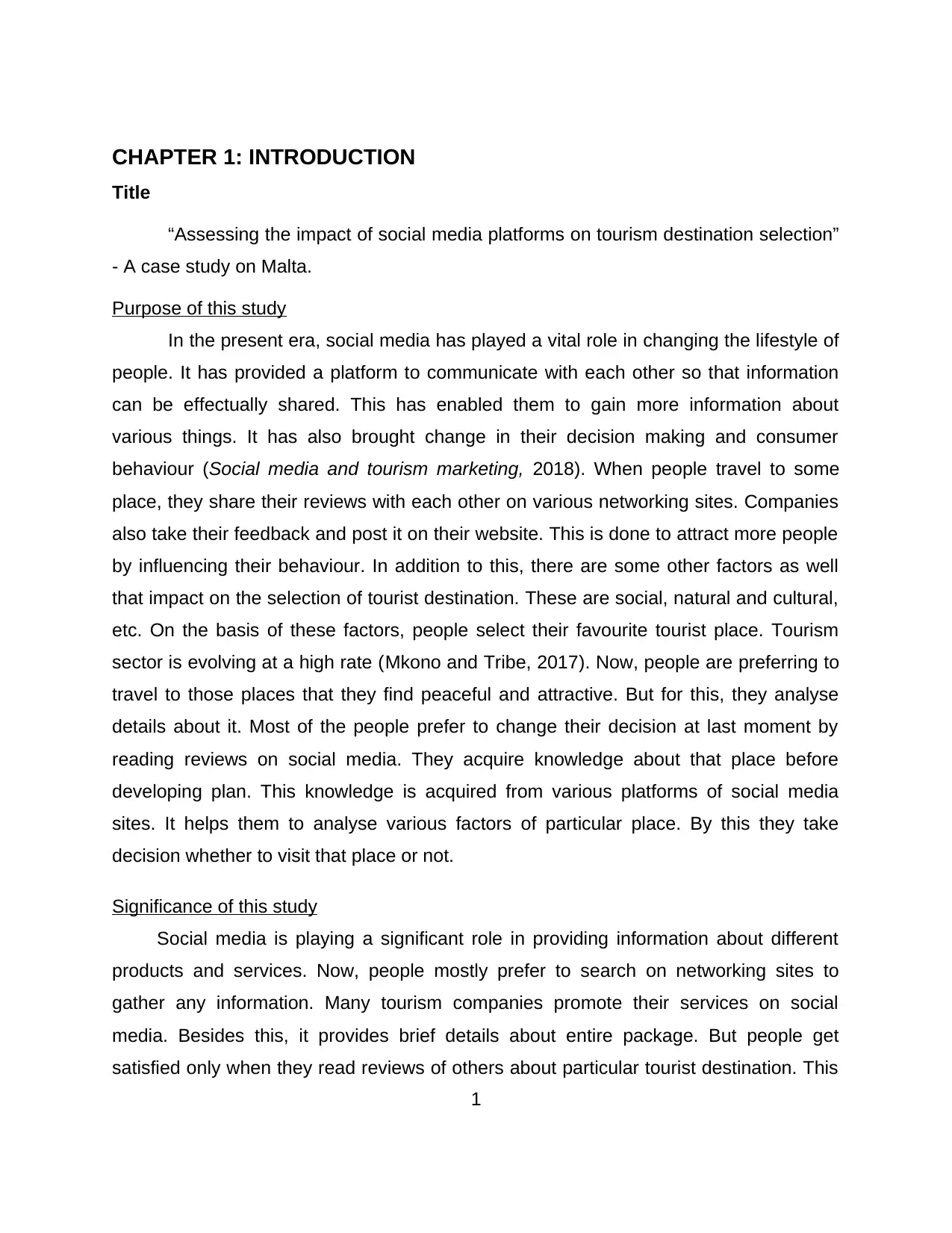
CHAPTER 1: INTRODUCTION
Title
“Assessing the impact of social media platforms on tourism destination selection”
- A case study on Malta.
Purpose of this study
In the present era, social media has played a vital role in changing the lifestyle of
people. It has provided a platform to communicate with each other so that information
can be effectually shared. This has enabled them to gain more information about
various things. It has also brought change in their decision making and consumer
behaviour (Social media and tourism marketing, 2018). When people travel to some
place, they share their reviews with each other on various networking sites. Companies
also take their feedback and post it on their website. This is done to attract more people
by influencing their behaviour. In addition to this, there are some other factors as well
that impact on the selection of tourist destination. These are social, natural and cultural,
etc. On the basis of these factors, people select their favourite tourist place. Tourism
sector is evolving at a high rate (Mkono and Tribe, 2017). Now, people are preferring to
travel to those places that they find peaceful and attractive. But for this, they analyse
details about it. Most of the people prefer to change their decision at last moment by
reading reviews on social media. They acquire knowledge about that place before
developing plan. This knowledge is acquired from various platforms of social media
sites. It helps them to analyse various factors of particular place. By this they take
decision whether to visit that place or not.
Significance of this study
Social media is playing a significant role in providing information about different
products and services. Now, people mostly prefer to search on networking sites to
gather any information. Many tourism companies promote their services on social
media. Besides this, it provides brief details about entire package. But people get
satisfied only when they read reviews of others about particular tourist destination. This
1
Title
“Assessing the impact of social media platforms on tourism destination selection”
- A case study on Malta.
Purpose of this study
In the present era, social media has played a vital role in changing the lifestyle of
people. It has provided a platform to communicate with each other so that information
can be effectually shared. This has enabled them to gain more information about
various things. It has also brought change in their decision making and consumer
behaviour (Social media and tourism marketing, 2018). When people travel to some
place, they share their reviews with each other on various networking sites. Companies
also take their feedback and post it on their website. This is done to attract more people
by influencing their behaviour. In addition to this, there are some other factors as well
that impact on the selection of tourist destination. These are social, natural and cultural,
etc. On the basis of these factors, people select their favourite tourist place. Tourism
sector is evolving at a high rate (Mkono and Tribe, 2017). Now, people are preferring to
travel to those places that they find peaceful and attractive. But for this, they analyse
details about it. Most of the people prefer to change their decision at last moment by
reading reviews on social media. They acquire knowledge about that place before
developing plan. This knowledge is acquired from various platforms of social media
sites. It helps them to analyse various factors of particular place. By this they take
decision whether to visit that place or not.
Significance of this study
Social media is playing a significant role in providing information about different
products and services. Now, people mostly prefer to search on networking sites to
gather any information. Many tourism companies promote their services on social
media. Besides this, it provides brief details about entire package. But people get
satisfied only when they read reviews of others about particular tourist destination. This
1
⊘ This is a preview!⊘
Do you want full access?
Subscribe today to unlock all pages.

Trusted by 1+ million students worldwide
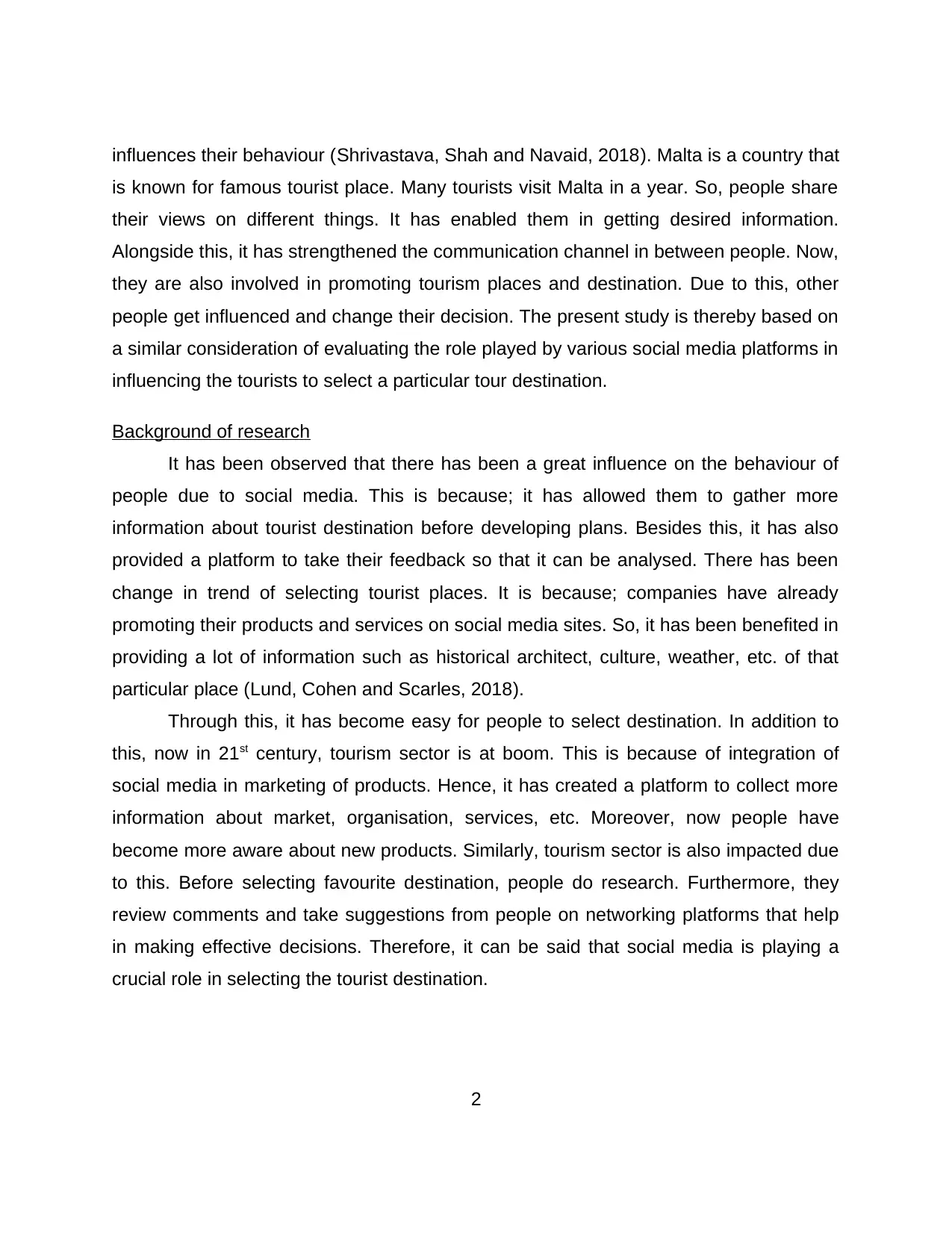
influences their behaviour (Shrivastava, Shah and Navaid, 2018). Malta is a country that
is known for famous tourist place. Many tourists visit Malta in a year. So, people share
their views on different things. It has enabled them in getting desired information.
Alongside this, it has strengthened the communication channel in between people. Now,
they are also involved in promoting tourism places and destination. Due to this, other
people get influenced and change their decision. The present study is thereby based on
a similar consideration of evaluating the role played by various social media platforms in
influencing the tourists to select a particular tour destination.
Background of research
It has been observed that there has been a great influence on the behaviour of
people due to social media. This is because; it has allowed them to gather more
information about tourist destination before developing plans. Besides this, it has also
provided a platform to take their feedback so that it can be analysed. There has been
change in trend of selecting tourist places. It is because; companies have already
promoting their products and services on social media sites. So, it has been benefited in
providing a lot of information such as historical architect, culture, weather, etc. of that
particular place (Lund, Cohen and Scarles, 2018).
Through this, it has become easy for people to select destination. In addition to
this, now in 21st century, tourism sector is at boom. This is because of integration of
social media in marketing of products. Hence, it has created a platform to collect more
information about market, organisation, services, etc. Moreover, now people have
become more aware about new products. Similarly, tourism sector is also impacted due
to this. Before selecting favourite destination, people do research. Furthermore, they
review comments and take suggestions from people on networking platforms that help
in making effective decisions. Therefore, it can be said that social media is playing a
crucial role in selecting the tourist destination.
2
is known for famous tourist place. Many tourists visit Malta in a year. So, people share
their views on different things. It has enabled them in getting desired information.
Alongside this, it has strengthened the communication channel in between people. Now,
they are also involved in promoting tourism places and destination. Due to this, other
people get influenced and change their decision. The present study is thereby based on
a similar consideration of evaluating the role played by various social media platforms in
influencing the tourists to select a particular tour destination.
Background of research
It has been observed that there has been a great influence on the behaviour of
people due to social media. This is because; it has allowed them to gather more
information about tourist destination before developing plans. Besides this, it has also
provided a platform to take their feedback so that it can be analysed. There has been
change in trend of selecting tourist places. It is because; companies have already
promoting their products and services on social media sites. So, it has been benefited in
providing a lot of information such as historical architect, culture, weather, etc. of that
particular place (Lund, Cohen and Scarles, 2018).
Through this, it has become easy for people to select destination. In addition to
this, now in 21st century, tourism sector is at boom. This is because of integration of
social media in marketing of products. Hence, it has created a platform to collect more
information about market, organisation, services, etc. Moreover, now people have
become more aware about new products. Similarly, tourism sector is also impacted due
to this. Before selecting favourite destination, people do research. Furthermore, they
review comments and take suggestions from people on networking platforms that help
in making effective decisions. Therefore, it can be said that social media is playing a
crucial role in selecting the tourist destination.
2
Paraphrase This Document
Need a fresh take? Get an instant paraphrase of this document with our AI Paraphraser
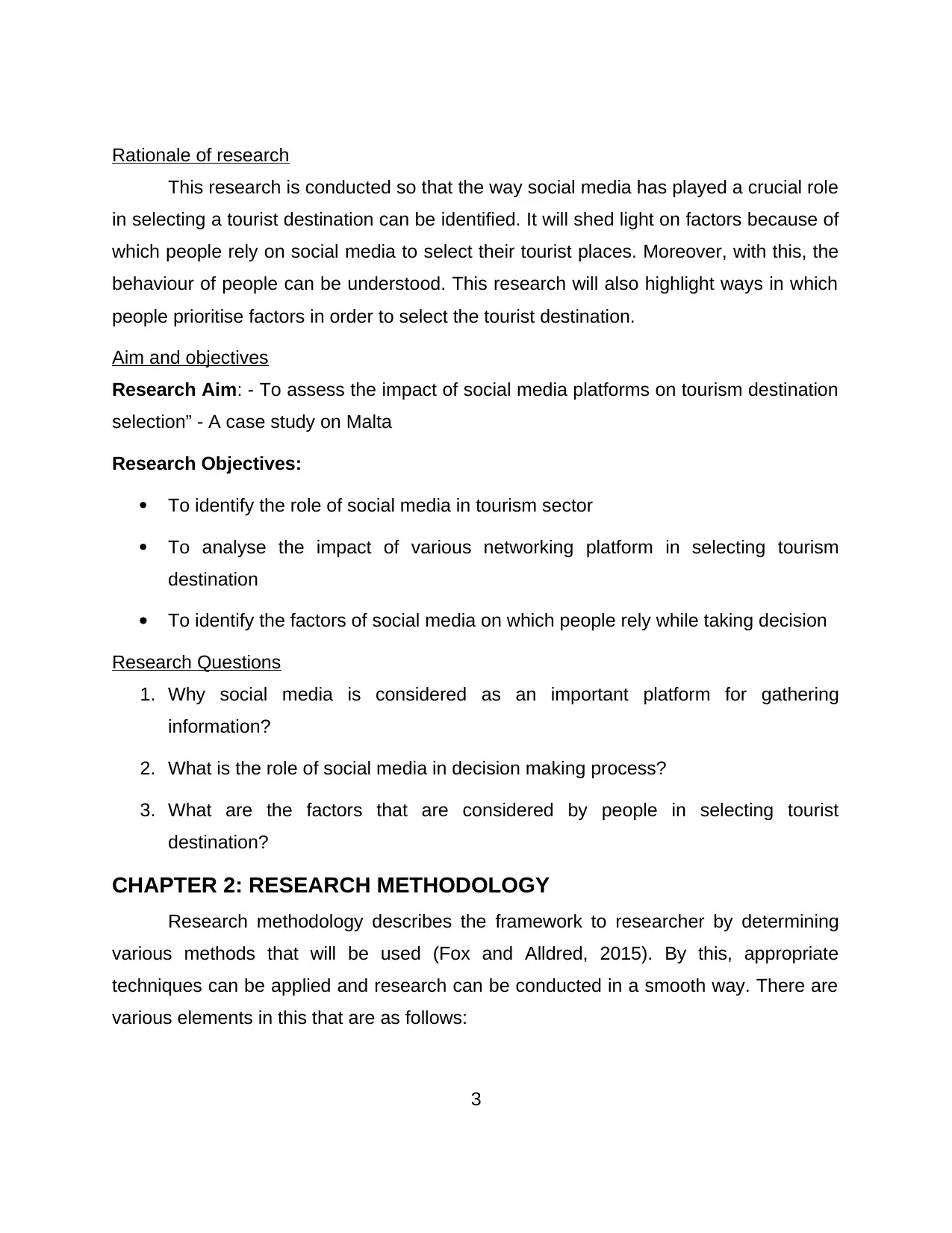
Rationale of research
This research is conducted so that the way social media has played a crucial role
in selecting a tourist destination can be identified. It will shed light on factors because of
which people rely on social media to select their tourist places. Moreover, with this, the
behaviour of people can be understood. This research will also highlight ways in which
people prioritise factors in order to select the tourist destination.
Aim and objectives
Research Aim: - To assess the impact of social media platforms on tourism destination
selection” - A case study on Malta
Research Objectives:
To identify the role of social media in tourism sector
To analyse the impact of various networking platform in selecting tourism
destination
To identify the factors of social media on which people rely while taking decision
Research Questions
1. Why social media is considered as an important platform for gathering
information?
2. What is the role of social media in decision making process?
3. What are the factors that are considered by people in selecting tourist
destination?
CHAPTER 2: RESEARCH METHODOLOGY
Research methodology describes the framework to researcher by determining
various methods that will be used (Fox and Alldred, 2015). By this, appropriate
techniques can be applied and research can be conducted in a smooth way. There are
various elements in this that are as follows:
3
This research is conducted so that the way social media has played a crucial role
in selecting a tourist destination can be identified. It will shed light on factors because of
which people rely on social media to select their tourist places. Moreover, with this, the
behaviour of people can be understood. This research will also highlight ways in which
people prioritise factors in order to select the tourist destination.
Aim and objectives
Research Aim: - To assess the impact of social media platforms on tourism destination
selection” - A case study on Malta
Research Objectives:
To identify the role of social media in tourism sector
To analyse the impact of various networking platform in selecting tourism
destination
To identify the factors of social media on which people rely while taking decision
Research Questions
1. Why social media is considered as an important platform for gathering
information?
2. What is the role of social media in decision making process?
3. What are the factors that are considered by people in selecting tourist
destination?
CHAPTER 2: RESEARCH METHODOLOGY
Research methodology describes the framework to researcher by determining
various methods that will be used (Fox and Alldred, 2015). By this, appropriate
techniques can be applied and research can be conducted in a smooth way. There are
various elements in this that are as follows:
3
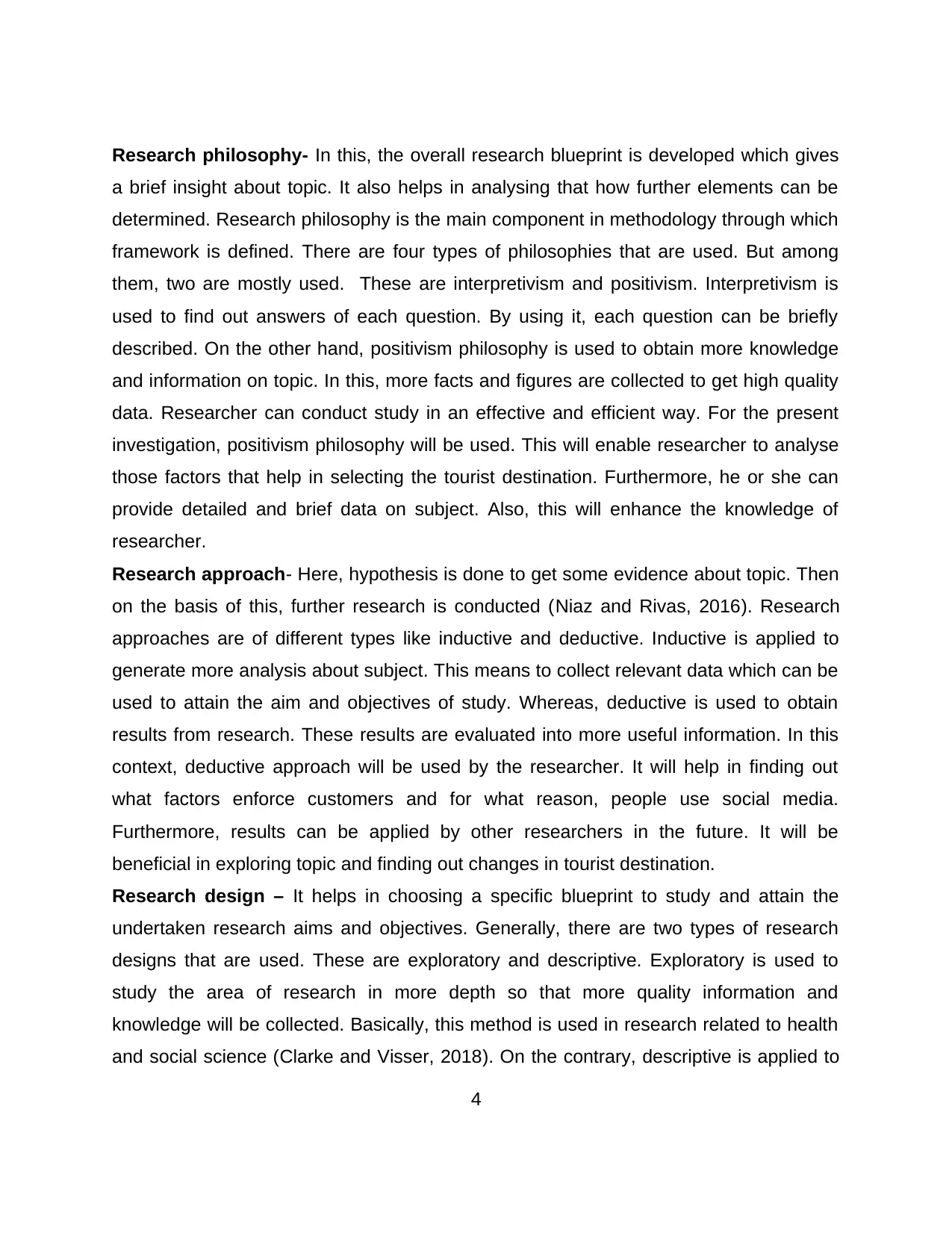
Research philosophy- In this, the overall research blueprint is developed which gives
a brief insight about topic. It also helps in analysing that how further elements can be
determined. Research philosophy is the main component in methodology through which
framework is defined. There are four types of philosophies that are used. But among
them, two are mostly used. These are interpretivism and positivism. Interpretivism is
used to find out answers of each question. By using it, each question can be briefly
described. On the other hand, positivism philosophy is used to obtain more knowledge
and information on topic. In this, more facts and figures are collected to get high quality
data. Researcher can conduct study in an effective and efficient way. For the present
investigation, positivism philosophy will be used. This will enable researcher to analyse
those factors that help in selecting the tourist destination. Furthermore, he or she can
provide detailed and brief data on subject. Also, this will enhance the knowledge of
researcher.
Research approach- Here, hypothesis is done to get some evidence about topic. Then
on the basis of this, further research is conducted (Niaz and Rivas, 2016). Research
approaches are of different types like inductive and deductive. Inductive is applied to
generate more analysis about subject. This means to collect relevant data which can be
used to attain the aim and objectives of study. Whereas, deductive is used to obtain
results from research. These results are evaluated into more useful information. In this
context, deductive approach will be used by the researcher. It will help in finding out
what factors enforce customers and for what reason, people use social media.
Furthermore, results can be applied by other researchers in the future. It will be
beneficial in exploring topic and finding out changes in tourist destination.
Research design – It helps in choosing a specific blueprint to study and attain the
undertaken research aims and objectives. Generally, there are two types of research
designs that are used. These are exploratory and descriptive. Exploratory is used to
study the area of research in more depth so that more quality information and
knowledge will be collected. Basically, this method is used in research related to health
and social science (Clarke and Visser, 2018). On the contrary, descriptive is applied to
4
a brief insight about topic. It also helps in analysing that how further elements can be
determined. Research philosophy is the main component in methodology through which
framework is defined. There are four types of philosophies that are used. But among
them, two are mostly used. These are interpretivism and positivism. Interpretivism is
used to find out answers of each question. By using it, each question can be briefly
described. On the other hand, positivism philosophy is used to obtain more knowledge
and information on topic. In this, more facts and figures are collected to get high quality
data. Researcher can conduct study in an effective and efficient way. For the present
investigation, positivism philosophy will be used. This will enable researcher to analyse
those factors that help in selecting the tourist destination. Furthermore, he or she can
provide detailed and brief data on subject. Also, this will enhance the knowledge of
researcher.
Research approach- Here, hypothesis is done to get some evidence about topic. Then
on the basis of this, further research is conducted (Niaz and Rivas, 2016). Research
approaches are of different types like inductive and deductive. Inductive is applied to
generate more analysis about subject. This means to collect relevant data which can be
used to attain the aim and objectives of study. Whereas, deductive is used to obtain
results from research. These results are evaluated into more useful information. In this
context, deductive approach will be used by the researcher. It will help in finding out
what factors enforce customers and for what reason, people use social media.
Furthermore, results can be applied by other researchers in the future. It will be
beneficial in exploring topic and finding out changes in tourist destination.
Research design – It helps in choosing a specific blueprint to study and attain the
undertaken research aims and objectives. Generally, there are two types of research
designs that are used. These are exploratory and descriptive. Exploratory is used to
study the area of research in more depth so that more quality information and
knowledge will be collected. Basically, this method is used in research related to health
and social science (Clarke and Visser, 2018). On the contrary, descriptive is applied to
4
⊘ This is a preview!⊘
Do you want full access?
Subscribe today to unlock all pages.

Trusted by 1+ million students worldwide
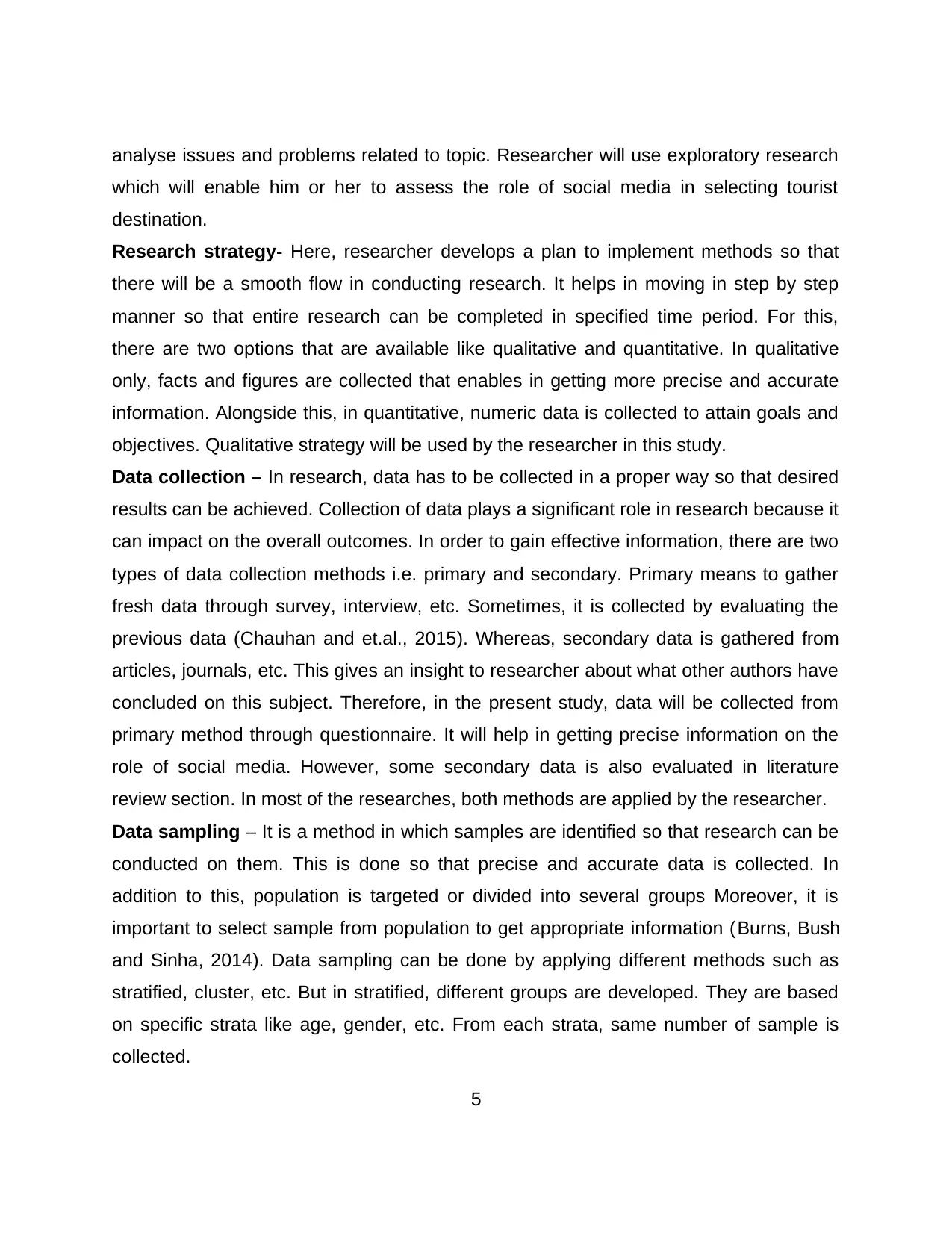
analyse issues and problems related to topic. Researcher will use exploratory research
which will enable him or her to assess the role of social media in selecting tourist
destination.
Research strategy- Here, researcher develops a plan to implement methods so that
there will be a smooth flow in conducting research. It helps in moving in step by step
manner so that entire research can be completed in specified time period. For this,
there are two options that are available like qualitative and quantitative. In qualitative
only, facts and figures are collected that enables in getting more precise and accurate
information. Alongside this, in quantitative, numeric data is collected to attain goals and
objectives. Qualitative strategy will be used by the researcher in this study.
Data collection – In research, data has to be collected in a proper way so that desired
results can be achieved. Collection of data plays a significant role in research because it
can impact on the overall outcomes. In order to gain effective information, there are two
types of data collection methods i.e. primary and secondary. Primary means to gather
fresh data through survey, interview, etc. Sometimes, it is collected by evaluating the
previous data (Chauhan and et.al., 2015). Whereas, secondary data is gathered from
articles, journals, etc. This gives an insight to researcher about what other authors have
concluded on this subject. Therefore, in the present study, data will be collected from
primary method through questionnaire. It will help in getting precise information on the
role of social media. However, some secondary data is also evaluated in literature
review section. In most of the researches, both methods are applied by the researcher.
Data sampling – It is a method in which samples are identified so that research can be
conducted on them. This is done so that precise and accurate data is collected. In
addition to this, population is targeted or divided into several groups Moreover, it is
important to select sample from population to get appropriate information (Burns, Bush
and Sinha, 2014). Data sampling can be done by applying different methods such as
stratified, cluster, etc. But in stratified, different groups are developed. They are based
on specific strata like age, gender, etc. From each strata, same number of sample is
collected.
5
which will enable him or her to assess the role of social media in selecting tourist
destination.
Research strategy- Here, researcher develops a plan to implement methods so that
there will be a smooth flow in conducting research. It helps in moving in step by step
manner so that entire research can be completed in specified time period. For this,
there are two options that are available like qualitative and quantitative. In qualitative
only, facts and figures are collected that enables in getting more precise and accurate
information. Alongside this, in quantitative, numeric data is collected to attain goals and
objectives. Qualitative strategy will be used by the researcher in this study.
Data collection – In research, data has to be collected in a proper way so that desired
results can be achieved. Collection of data plays a significant role in research because it
can impact on the overall outcomes. In order to gain effective information, there are two
types of data collection methods i.e. primary and secondary. Primary means to gather
fresh data through survey, interview, etc. Sometimes, it is collected by evaluating the
previous data (Chauhan and et.al., 2015). Whereas, secondary data is gathered from
articles, journals, etc. This gives an insight to researcher about what other authors have
concluded on this subject. Therefore, in the present study, data will be collected from
primary method through questionnaire. It will help in getting precise information on the
role of social media. However, some secondary data is also evaluated in literature
review section. In most of the researches, both methods are applied by the researcher.
Data sampling – It is a method in which samples are identified so that research can be
conducted on them. This is done so that precise and accurate data is collected. In
addition to this, population is targeted or divided into several groups Moreover, it is
important to select sample from population to get appropriate information (Burns, Bush
and Sinha, 2014). Data sampling can be done by applying different methods such as
stratified, cluster, etc. But in stratified, different groups are developed. They are based
on specific strata like age, gender, etc. From each strata, same number of sample is
collected.
5
Paraphrase This Document
Need a fresh take? Get an instant paraphrase of this document with our AI Paraphraser
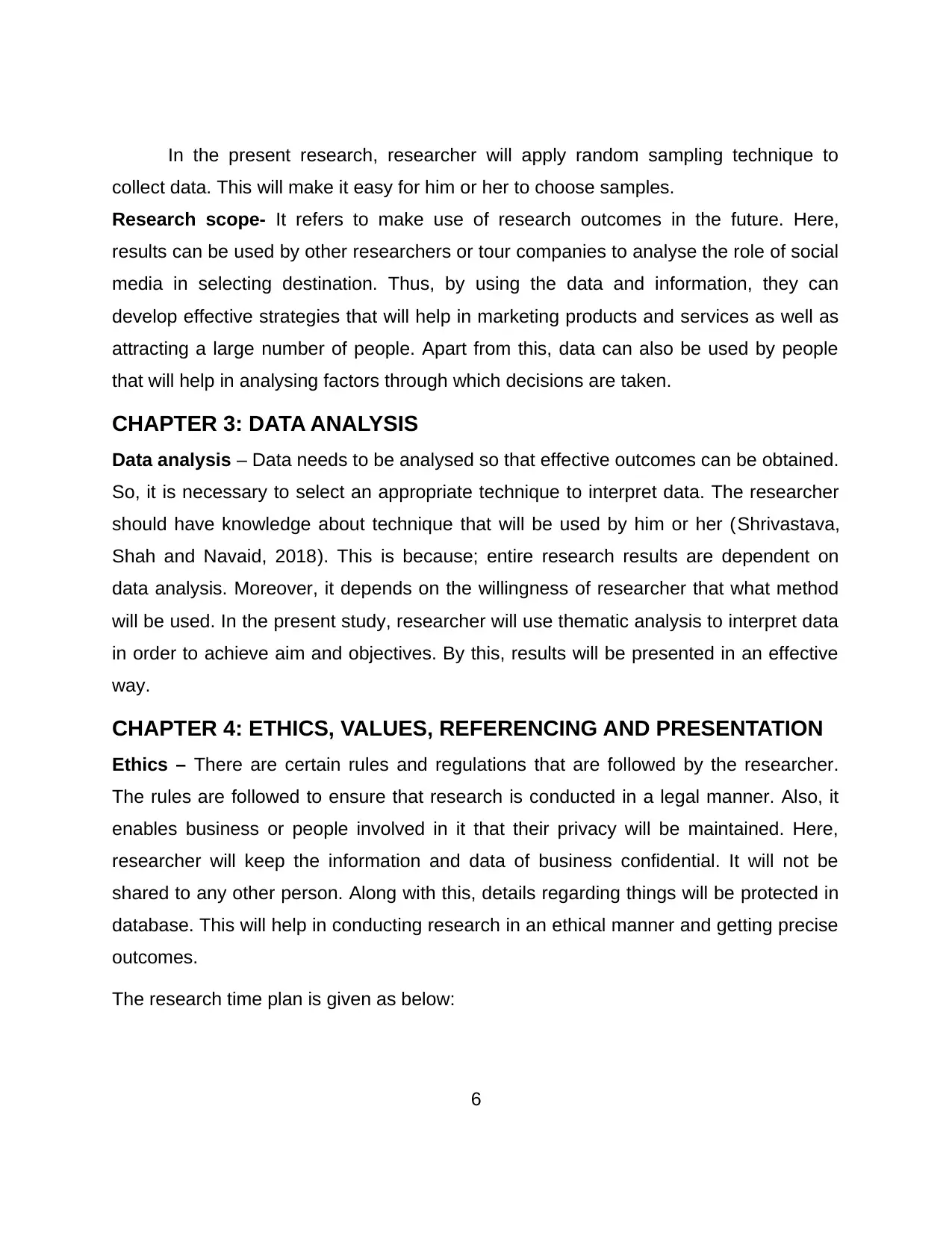
In the present research, researcher will apply random sampling technique to
collect data. This will make it easy for him or her to choose samples.
Research scope- It refers to make use of research outcomes in the future. Here,
results can be used by other researchers or tour companies to analyse the role of social
media in selecting destination. Thus, by using the data and information, they can
develop effective strategies that will help in marketing products and services as well as
attracting a large number of people. Apart from this, data can also be used by people
that will help in analysing factors through which decisions are taken.
CHAPTER 3: DATA ANALYSIS
Data analysis – Data needs to be analysed so that effective outcomes can be obtained.
So, it is necessary to select an appropriate technique to interpret data. The researcher
should have knowledge about technique that will be used by him or her (Shrivastava,
Shah and Navaid, 2018). This is because; entire research results are dependent on
data analysis. Moreover, it depends on the willingness of researcher that what method
will be used. In the present study, researcher will use thematic analysis to interpret data
in order to achieve aim and objectives. By this, results will be presented in an effective
way.
CHAPTER 4: ETHICS, VALUES, REFERENCING AND PRESENTATION
Ethics – There are certain rules and regulations that are followed by the researcher.
The rules are followed to ensure that research is conducted in a legal manner. Also, it
enables business or people involved in it that their privacy will be maintained. Here,
researcher will keep the information and data of business confidential. It will not be
shared to any other person. Along with this, details regarding things will be protected in
database. This will help in conducting research in an ethical manner and getting precise
outcomes.
The research time plan is given as below:
6
collect data. This will make it easy for him or her to choose samples.
Research scope- It refers to make use of research outcomes in the future. Here,
results can be used by other researchers or tour companies to analyse the role of social
media in selecting destination. Thus, by using the data and information, they can
develop effective strategies that will help in marketing products and services as well as
attracting a large number of people. Apart from this, data can also be used by people
that will help in analysing factors through which decisions are taken.
CHAPTER 3: DATA ANALYSIS
Data analysis – Data needs to be analysed so that effective outcomes can be obtained.
So, it is necessary to select an appropriate technique to interpret data. The researcher
should have knowledge about technique that will be used by him or her (Shrivastava,
Shah and Navaid, 2018). This is because; entire research results are dependent on
data analysis. Moreover, it depends on the willingness of researcher that what method
will be used. In the present study, researcher will use thematic analysis to interpret data
in order to achieve aim and objectives. By this, results will be presented in an effective
way.
CHAPTER 4: ETHICS, VALUES, REFERENCING AND PRESENTATION
Ethics – There are certain rules and regulations that are followed by the researcher.
The rules are followed to ensure that research is conducted in a legal manner. Also, it
enables business or people involved in it that their privacy will be maintained. Here,
researcher will keep the information and data of business confidential. It will not be
shared to any other person. Along with this, details regarding things will be protected in
database. This will help in conducting research in an ethical manner and getting precise
outcomes.
The research time plan is given as below:
6
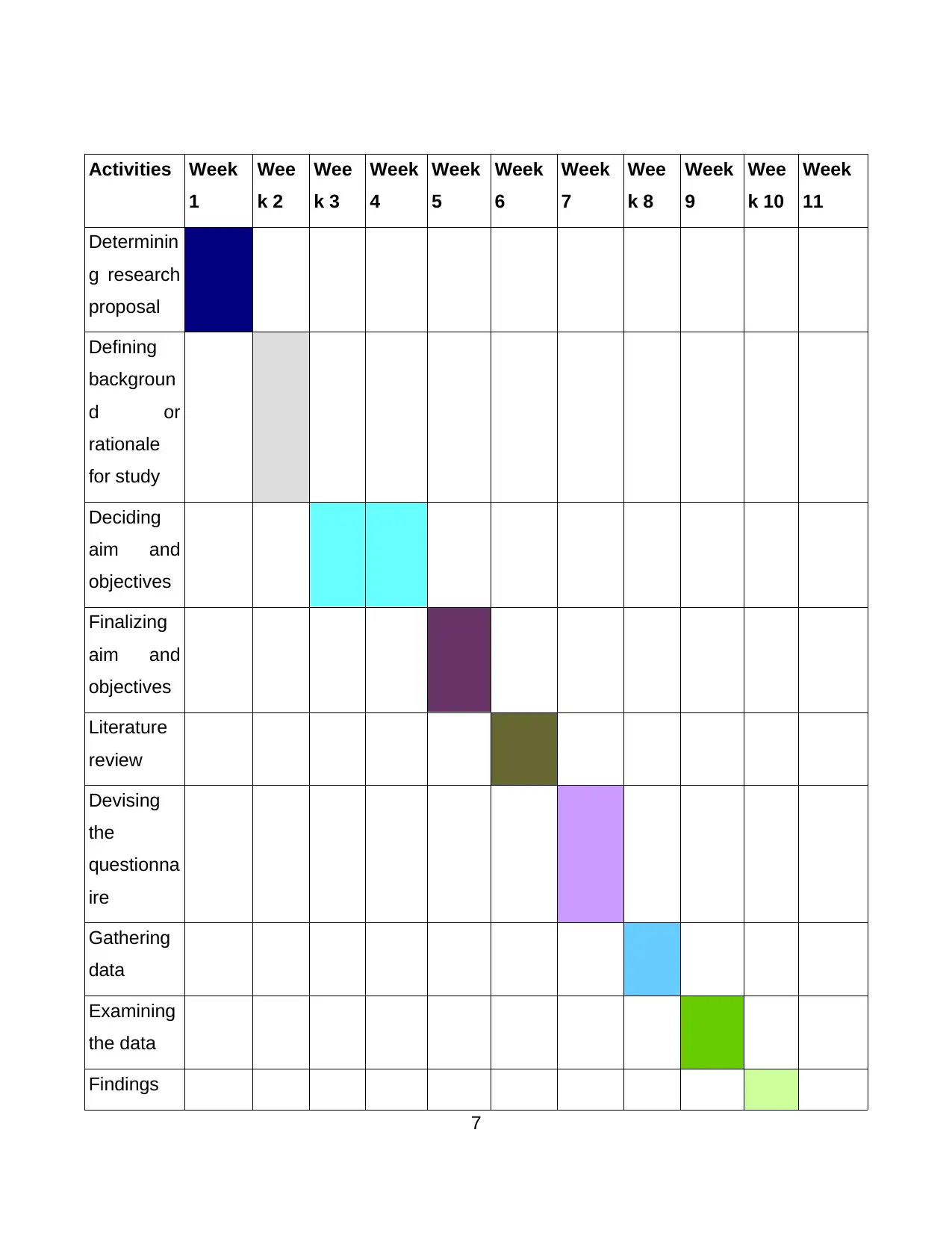
Activities Week
1
Wee
k 2
Wee
k 3
Week
4
Week
5
Week
6
Week
7
Wee
k 8
Week
9
Wee
k 10
Week
11
Determinin
g research
proposal
Defining
backgroun
d or
rationale
for study
Deciding
aim and
objectives
Finalizing
aim and
objectives
Literature
review
Devising
the
questionna
ire
Gathering
data
Examining
the data
Findings
7
1
Wee
k 2
Wee
k 3
Week
4
Week
5
Week
6
Week
7
Wee
k 8
Week
9
Wee
k 10
Week
11
Determinin
g research
proposal
Defining
backgroun
d or
rationale
for study
Deciding
aim and
objectives
Finalizing
aim and
objectives
Literature
review
Devising
the
questionna
ire
Gathering
data
Examining
the data
Findings
7
⊘ This is a preview!⊘
Do you want full access?
Subscribe today to unlock all pages.

Trusted by 1+ million students worldwide
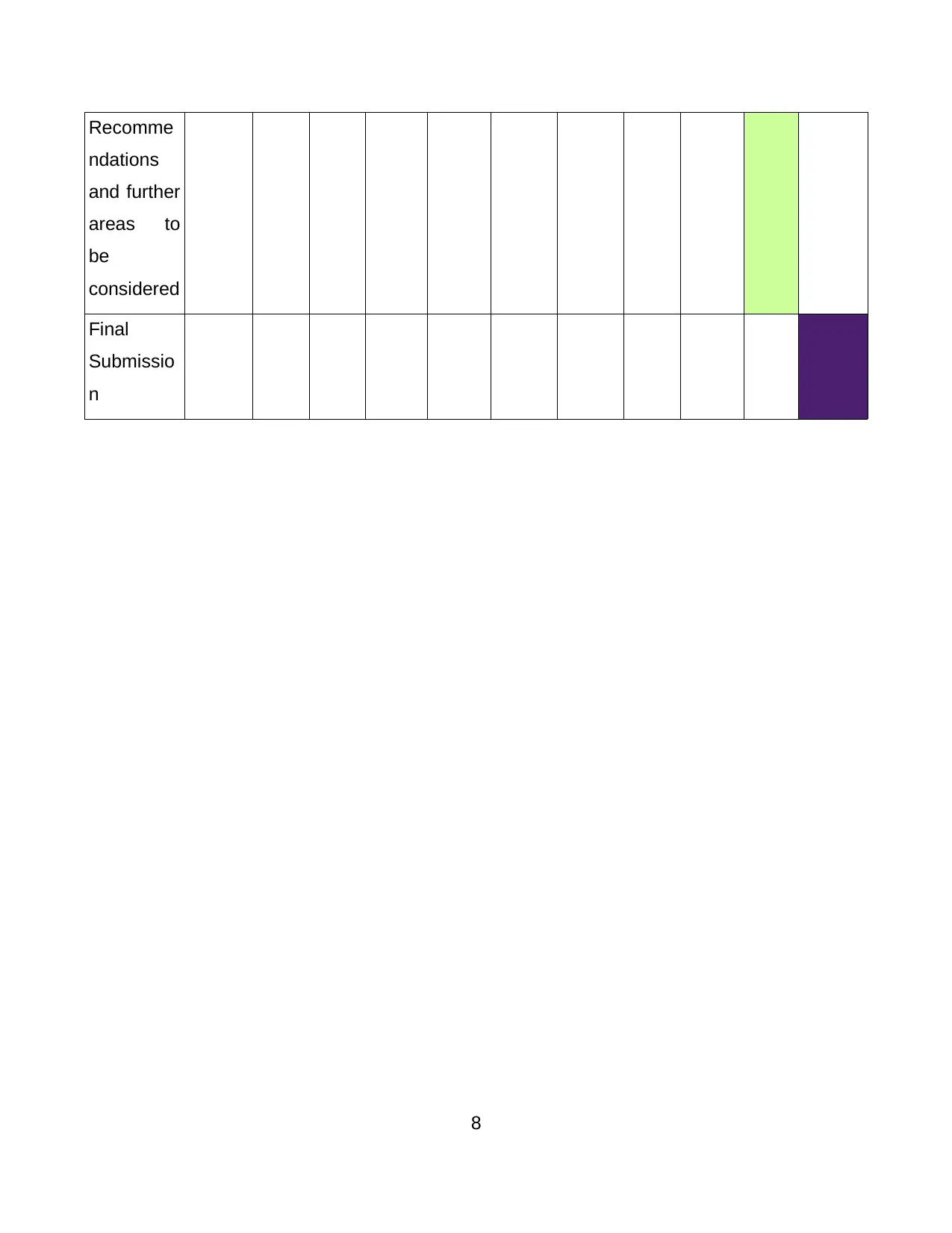
Recomme
ndations
and further
areas to
be
considered
Final
Submissio
n
8
ndations
and further
areas to
be
considered
Final
Submissio
n
8
Paraphrase This Document
Need a fresh take? Get an instant paraphrase of this document with our AI Paraphraser
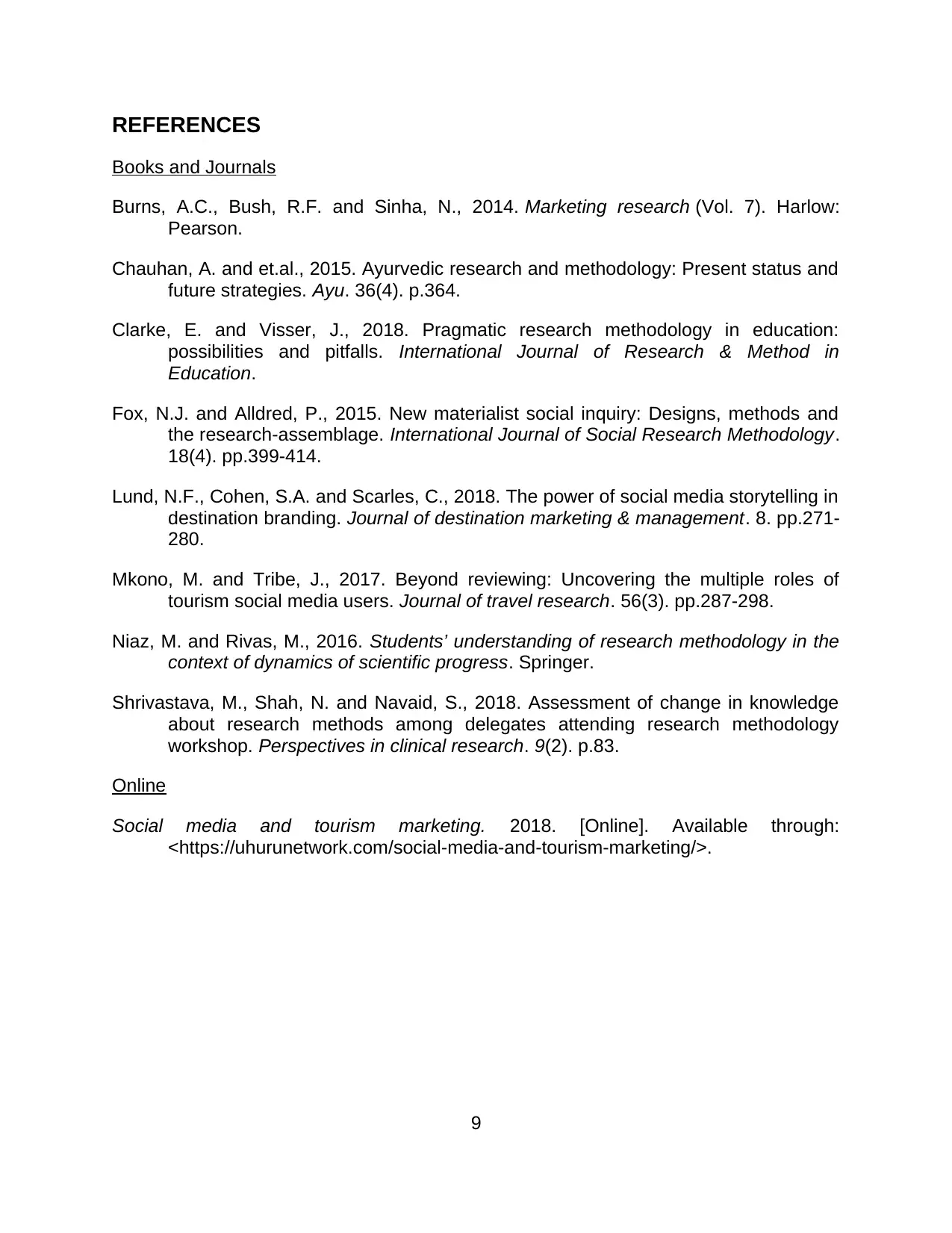
REFERENCES
Books and Journals
Burns, A.C., Bush, R.F. and Sinha, N., 2014. Marketing research (Vol. 7). Harlow:
Pearson.
Chauhan, A. and et.al., 2015. Ayurvedic research and methodology: Present status and
future strategies. Ayu. 36(4). p.364.
Clarke, E. and Visser, J., 2018. Pragmatic research methodology in education:
possibilities and pitfalls. International Journal of Research & Method in
Education.
Fox, N.J. and Alldred, P., 2015. New materialist social inquiry: Designs, methods and
the research-assemblage. International Journal of Social Research Methodology.
18(4). pp.399-414.
Lund, N.F., Cohen, S.A. and Scarles, C., 2018. The power of social media storytelling in
destination branding. Journal of destination marketing & management. 8. pp.271-
280.
Mkono, M. and Tribe, J., 2017. Beyond reviewing: Uncovering the multiple roles of
tourism social media users. Journal of travel research. 56(3). pp.287-298.
Niaz, M. and Rivas, M., 2016. Students’ understanding of research methodology in the
context of dynamics of scientific progress. Springer.
Shrivastava, M., Shah, N. and Navaid, S., 2018. Assessment of change in knowledge
about research methods among delegates attending research methodology
workshop. Perspectives in clinical research. 9(2). p.83.
Online
Social media and tourism marketing. 2018. [Online]. Available through:
<https://uhurunetwork.com/social-media-and-tourism-marketing/>.
9
Books and Journals
Burns, A.C., Bush, R.F. and Sinha, N., 2014. Marketing research (Vol. 7). Harlow:
Pearson.
Chauhan, A. and et.al., 2015. Ayurvedic research and methodology: Present status and
future strategies. Ayu. 36(4). p.364.
Clarke, E. and Visser, J., 2018. Pragmatic research methodology in education:
possibilities and pitfalls. International Journal of Research & Method in
Education.
Fox, N.J. and Alldred, P., 2015. New materialist social inquiry: Designs, methods and
the research-assemblage. International Journal of Social Research Methodology.
18(4). pp.399-414.
Lund, N.F., Cohen, S.A. and Scarles, C., 2018. The power of social media storytelling in
destination branding. Journal of destination marketing & management. 8. pp.271-
280.
Mkono, M. and Tribe, J., 2017. Beyond reviewing: Uncovering the multiple roles of
tourism social media users. Journal of travel research. 56(3). pp.287-298.
Niaz, M. and Rivas, M., 2016. Students’ understanding of research methodology in the
context of dynamics of scientific progress. Springer.
Shrivastava, M., Shah, N. and Navaid, S., 2018. Assessment of change in knowledge
about research methods among delegates attending research methodology
workshop. Perspectives in clinical research. 9(2). p.83.
Online
Social media and tourism marketing. 2018. [Online]. Available through:
<https://uhurunetwork.com/social-media-and-tourism-marketing/>.
9
1 out of 11
Related Documents
Your All-in-One AI-Powered Toolkit for Academic Success.
+13062052269
info@desklib.com
Available 24*7 on WhatsApp / Email
![[object Object]](/_next/static/media/star-bottom.7253800d.svg)
Unlock your academic potential
Copyright © 2020–2025 A2Z Services. All Rights Reserved. Developed and managed by ZUCOL.




